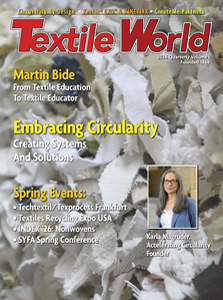Although US Secretary of the Treasury Henry M. Paulson, Jr. touted the success of last week’s
US/China Strategic Economic Dialogue (SED), textile and other manufacturers were less than excited
about it. At the conclusion of the talks at the US Naval Academy in Annapolis, Md., Paulson said, “
I am pleased that we continue to build stronger relationships between our leaders and our countries
and that this innovative effort to strengthen a unique economic relationship is a success.”
Paulson cited success in dealing with two specific initiatives — energy and environmental
cooperation. He pointed out that China and the United States are the two largest net importers of
oil, account for more than half of the world’s coal consumption and are the two largest emitters of
greenhouse gases. He announced that the two countries will sign a 10-year Energy and Environmental
Cooperation Framework. Paulson also said the two nations have agreed to launch negotiations on a
bilateral investment treaty that he said could lead to treating each other’s investors in a “fair
and transparent manner.”
Textile and other industry representatives in Washington expressed their disappointment that
the talks did not focus on international trade issues, and particularly, what they see as China’s
manipulation of its currency in order to gain advantages in international trade. The Alliance for
American Manufacturing (AAM), a partnership of labor and industry representatives, said the talks “
squandered an opportunity to make China trade more balanced and market driven.” AAM’s Executive
Director Scott Paul said the SED is built on a “flawed premise” that periodic discussions alone can
achieve progress on critical issues. He called for a “more robust” approach from Washington that
includes specific objectives, a mechanism for assessing progress, and incentives for making
progress and punitive measures for backsliding.
Prior to the opening of the talks, a bipartisan group of 11 senators sent a letter to
Secretary Paulson urging him to “push the Chinese government to stop manipulating its currency and
allow great appreciation of its renminbi (RMB).”
In part, the letter said: “The lack of significant progress on the continuously misaligned
RMB has substantial negative effects on American manufacturers. China’s long-standing policy of
undervaluing its currency —in violation of the International Monetary Fund commitments —
effectively gives an unfair competitive advantage of up to 40 percent to its frequently state-run
firms. The unfair price advantage that the under-valued RMB gives Chinese firms has forced many
American companies to declare bankruptcy or even to go out of business, harming our workers,
families and middle class.”
The senators said they believe US manufacturers can compete in a world economy, but that they
cannot compete when their competitors are supported by government policies that deliberately make
their exports artificially cheaper. The letter was signed by Democratic Sens. Barack Obama, Ill.;
Sherrod Brown, Ohio; Sander Levin, Mich.; Evan Bayh, Ind.; Debbie Stabenow, Mich.; Charles Schumer,
N.Y.; and Sheldon Whitehouse, R.I.; and Republican Sens. Elizabeth Dole, N.C.; Jim Bunning, Ky.;
Olympia Snow, Maine; and Kent Conrad, Mont.
Secretary Paulson said China has been making some progress toward increasing the pace of its
currency appreciation, but he urged the Chinese to continue its move toward currency flexibility.
June 24, 2008




